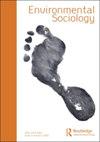什么算证据?印度喀拉拉邦环境正义运动中关于农药暴露和病因的争议
IF 2.8
Q3 ENVIRONMENTAL STUDIES
引用次数: 1
摘要
科学证据和知识是环境正义运动的核心。农药毒性案件经常导致围绕证据的性质及其与观察到的病理学的因果关系出现争议。毒性作用取决于多种社会生态条件,如时间和地点、持续时间和给药方式,这使得可量化的病因变得脆弱。对有毒暴露问题的研究表明,监管科学在建立因果关系方面存在局限性,并主张采用各种知情方式来理解、承认和应对暴露造成的伤害。这篇文章借鉴了在喀拉拉邦北部进行的社会学研究,1977年至2000年间,该邦持续使用杀虫剂硫丹对农场工人和普通民众的健康产生了重大影响。我们将硫丹中毒案作为一个例子,因为农业科学家坚持提供病因证明,这实际上损害了硫丹受害者的正义,因此产生了对证据的争议和因果关系的不确定性。我们认为,在以经济为导向的生产型农业中,农业科学家、政府和农药行业等强大的行动者将科学作为一种工具来维持不确定性,并将其作为一种资源来掩盖真相,从而使关于补救政策和行动的主张变得不可能。本文章由计算机程序翻译,如有差异,请以英文原文为准。
What counts as evidence? Examining the controversy over pesticide exposure and etiology in an environmental justice movement in Kerala, India
ABSTRACT Scientific evidence and knowledge are central to movements for environmental justice. Cases of pesticide toxicity have often led to the emergence of controversies around the nature of evidence and its causal connection to observed pathologies. Toxic effects depend on multiple, situated socioecological conditions such as time and place, duration, and mode of administration, making quantifiable etiology tenuous. Research on toxic exposure issues has shown limitations of regulatory sciences in establishing causality and argued for bringing various ways of knowing to understand, acknowledge and act against harms due to exposure. This article draws on sociological research carried out in northern Kerala, where continued use of the insecticide endosulfan between 1977 and 2000 has had significant health impacts on farmworkers and the general population. We present the case of endosulfan poisoning as an instance of controversy over evidence and uncertainty about causality emerging from agriculture scientists’ insistence on proof of etiology that has effectively jeopardized justice for endosulfan victims. We argue that, in cases of economy-oriented production agriculture, powerful actors like agriculture scientists, governments and the pesticide industry use science as a tool to maintain uncertainty as a resource to obscure the truth, making claims about reparative policies and actions impossible.
求助全文
通过发布文献求助,成功后即可免费获取论文全文。
去求助
来源期刊

Environmental Sociology
ENVIRONMENTAL STUDIES-
CiteScore
4.60
自引率
12.00%
发文量
34
期刊介绍:
Environmental Sociology is dedicated to applying and advancing the sociological imagination in relation to a wide variety of environmental challenges, controversies and issues, at every level from the global to local, from ‘world culture’ to diverse local perspectives. As an international, peer-reviewed scholarly journal, Environmental Sociology aims to stretch the conceptual and theoretical boundaries of both environmental and mainstream sociology, to highlight the relevance of sociological research for environmental policy and management, to disseminate the results of sociological research, and to engage in productive dialogue and debate with other disciplines in the social, natural and ecological sciences. Contributions may utilize a variety of theoretical orientations including, but not restricted to: critical theory, cultural sociology, ecofeminism, ecological modernization, environmental justice, organizational sociology, political ecology, political economy, post-colonial studies, risk theory, social psychology, science and technology studies, globalization, world-systems analysis, and so on. Cross- and transdisciplinary contributions are welcome where they demonstrate a novel attempt to understand social-ecological relationships in a manner that engages with the core concerns of sociology in social relationships, institutions, practices and processes. All methodological approaches in the environmental social sciences – qualitative, quantitative, integrative, spatial, policy analysis, etc. – are welcomed. Environmental Sociology welcomes high-quality submissions from scholars around the world.
 求助内容:
求助内容: 应助结果提醒方式:
应助结果提醒方式:


